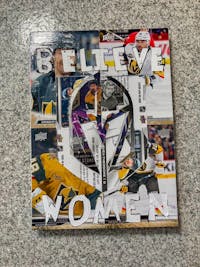Improv theater group transforms stories
The library formally closes at 8 p.m. on a Friday night, but Rapaporte Treasure Hall was full of activity this weekend - and it wasn't studying. In an interactive performance sponsored by the Slifka Program in Intercommunal Existence, members of the Hudson River Playback Theatre acted out the stories and thoughts of audience members in an improvisational form of "playback theater." The event, also supported in part by the Hewlett Pluralism Alliance, served as a artistic approach to addressing diversity and conflict resolution, surrounding the theme of "Dialogue and Reconciliation: Stories of Challenges and Transformation."
The Hudson River Playback Theatre is based in New Paltz, N.Y. and has performed for the last 13 years throughout the Hudson Valley in theaters and conferences.Working off minimal information, the diverse six-person team of actors and musicians brought to life the stories shared by selected audience members from the about 100 people in attendance. Using piano and percussion music as background, the actors moved, swayed, sang and worked off each other to create both brief and extended cohesive theatrical expressions of a certain presented narrative or scenario.
The audience consisted of a diverse sampling of the Brandeis, Boston and international communities. Less then half in attendance were students, but in attendance were ten Brandeis International Fellows - community members and peace builders from around the world at Brandeis for a week long workshop series on reconciliation through culture and the arts. Themes explored thoughout the night varied from the daily life of a Brandeis student, to finishing a paper right before deadline, to government agencies prohibiting dialogue with rebels in Burundi.
While the focus of the evening was on dialogue, the theatrical and musical performance was innovative and stimulating. Using their bodies and facial expressions, actors employed each other and the music to prompt their actions and speech in the performances. Their awareness of each other on stage and the cohesiveness marked true professionalism, but many of the explored themes could only be understood on a general level given the improvisational nature. Some of the motions and repetition seemed overly dramatic. Also, the performance may have benefited from a raised stage to ensure better viewing, but the hall's intimacy compensated for such a disadvantage. Overall, although a bit of an adjustment was needed given its unique qualities, the intimate and important stories shared by the audience are what made the event so worthwhile, truly making it a "vehicle for dialogue.



Please note All comments are eligible for publication in The Justice.